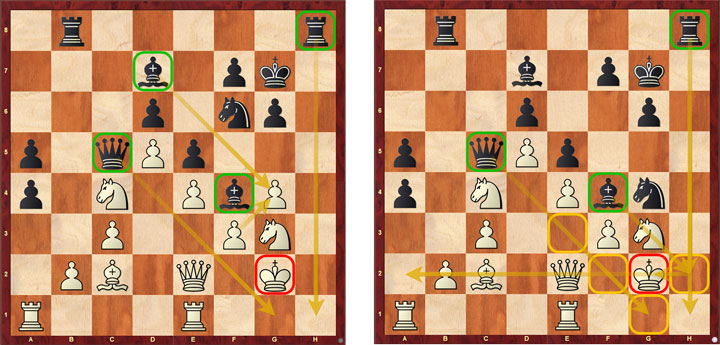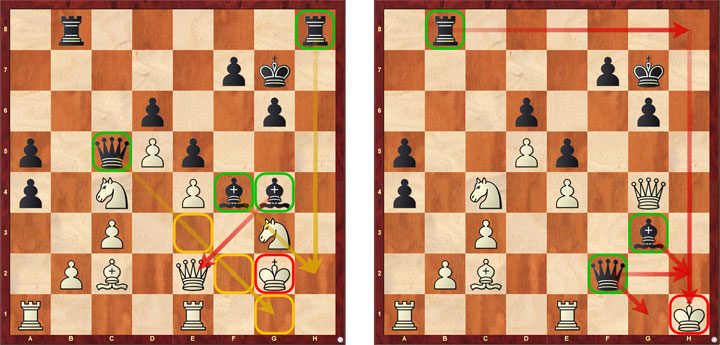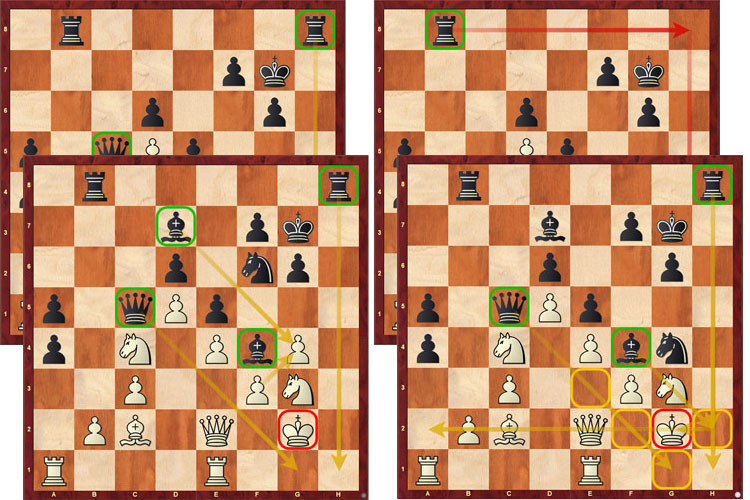My experience with ChessBase
By Simon
Hello everyone, I've now arrived at the last part of my article series: "Chess and Autism". I am glad that the last two parts could arouse your interest and I am grateful for this unique opportunity to make my experiences, feelings and own strategies available to a wide audience. And I would like to thank you for your positive feedback.
This last article of the three-part series is about my use of the ChessBase 15 program, which is simply the non plus ultra for every chess player, no matter whether amateur or professional. The focus will be on my experience with this extremely useful tool and my feelings and impressions of the program.
How did I get in touch with ChessBase in the first place?
Well, as so often in life, it worked via "Vitamin C" (connections). About half a year ago I was in contact with a member of Frederic Friedel's family. Contact to Frederic was established and we started exchanging emails. I told him about myself, my personality as an Asperger's autistic person, my special interests, my life in general, my interest in chess. He offered to send me ChessBase software, which I could use to improve my game. I got the ChessBase 15 program, a couple of tactics booklets, and premium ChessBase and Playchess accounts. He also ask me to choose any products from the ChessBase Shop that caught my interest.
The deal was that in return I would write articles for ChessBase, about my relationship to chess as an Asperger's autist. I gladly accepted this offer. A few months later we had an extensive telephone conversation, where we exchanged ideas in areas of common interests, mainly chess, science and the like. That was when I started writing this series.
A big thank you goes to ChessBase, and the entire team which stands behind the company, energetically and with a full thirst for action, coupled with outstanding expertise. It is a great honour for me to be able to write for such a unique company, and I will try very hard to make sure that everyone's taste is at least partially met as far as my topics and the way I describe them are concerned.
Of course, the software provided by ChessBase deserves special mention. It's really great to see the extent to which the quality of my chess understanding, both from a theoretical and practical point of view, has improved since I started using the software. The possibilities provided by the Premium Account were especially useful. I refer to the numerous Internet tournaments – German Championship, Amateur Championship and many more – which were held at the beginning of the Corona pandemic.
All in all it was a most gratifying experience, to extend my love of books to semi-professional writing, and to learn so many new things.
How I experienced the software
Most chess players I know use ChessBase 15 (redacción: ahora ya ChessBase 16). They are enthusiastic about the sheer spectrum of different applications and possibilities that the program offers them. And rightly so! It would go far beyond the scope of this article if I were to list all the functions of this masterpiece and explain them in detail. Nevertheless, I would like to give you an insight into the depths of the program and outline what is essential for me. These are, of course, functions that I consider to be particularly relevant and helpful, that I personally appreciate greatly, simply because of the great opportunity they offer to learn and improve, and the rich potential for me to continue to do so in the future.
First of all, I would like to briefly describe my use of the program, before I discuss the ideas and the possibilities associated with it for dealing productively and with a great deal of precision with one's own actions and creations – and then finally arrive at my conclusion. In all three aspects I will include my impressions, experiences, the scope of the various options, and my overall feelings.
As you know from the two parts previously published on the subject of autism and chess, I have now matured into a "real" tournament player, who on the one hand appreciates and loves the game of chess per se, and the whole shebang around tournaments. So I don't think it's surprising that, as far as my well-timed and structured schedule allows, I spend every day playing this very fascinating game. Usually it is 1-2 hours per day, including breaks.
ChessBase 15 of course plays a very big role in this. In my opinion it is indispensable for every at least halfway ambitious chess player to critically study his own games, to study the games of strong masters of the past and present, to take a close look at potential opponents and to build up his own structure on the basis of an individually shaped opening repertoire tailored to the respective style of play. ChessBase 15 is for me the key to a breathtaking and impressive world. However, I use it not only for the aspects just listed, but for much more. The most important ones for me are:
- the tactical analysis of my own games;
- the reference database to find out how often a certain move has been used and with what success;
- the comparison of a board position with similar structures; and
- the preparation for upcoming tournaments/team matches.
I find the design of the software very appealing. It is particularly important that I am able to create my own space, where I can store all my important data in a clear and well-structured form, gather knowledge and constantly expand it, store games in corresponding databases and comment on them if necessary. This is a very great experience for me and I have to say that I learn something new, however nuanced, almost every day!
I would also like to highlight other benefits that the program offers me, like the plausible structure, the good comprehensibility of many of the tools, the way it allows you to further educate and improve yourself in pretty much every area. In addition I also appreciate having the certainty that I can quickly repair anything I do wrong: something I have deleted can be undone in a worst-case scenario. I find this just as worth mentioning as the hidden opportunities to discover something new and, in the majority of cases, useful for oneself.
It is especially important for us autistic people that there is a certain fixed framework, which of course nevertheless offers enough space for our own development. In this way, it is easier and better for us to understand what specific purpose a task or, in this case, function fulfills and precisely why it was designed exactly this way and not any other. If I transfer this to a tournament situation, it means that the fewer the factors of an incidental nature surround me, the better my concentration and well-being. This is why we autistic people are often said (and rightly so!) to be very keen to assign everything to a fixed structure and to detach ourselves from anything with disruptive potential, so that we can bring out the abilities that lie dormant within us. This in turn leads in the next step to a controlled and thus better performance (because better filtered and differentiated), and this in all conceivable areas, be it school, work, training, study or in leisure time. In addition, we are often very open to stimuli, which means that we cannot perceive different factors/stimuli in a filtered way. This often leads to a so-called stimulus overload, which, at least in my case, is usually accompanied by headaches. With this, I just want to show you why we "tick" like this, what the triggers are and what is particularly important to us, both on a short-term and long-term time scale.
To come back to ChessBase 15 … All in all, I can say that I rate the use ChessBase 15 very highly, regardless of the level of play. It is still a great feeling for me, when I start the program and I can work on my databases on many diverse topics, such as openings, valuable psychological tips and methods, endgames, certain piece constellations, the use of the right technique, the development of a plan in the middlegame, important tactical as well as positional motifs, etc. I enjoy this immensely and it is enhanced by the study of my own games, which are of course also stored in databases.
But that is not all! It is a kind of "new" experience for me every time I move into other spheres the program has opened. For example, I was in the process of commenting a game of mine when I came across the very useful possibility to illustrate my own little works of art with the help of arrows and squares in the colours red, yellow and green.

This form of visualisation is highly relevant, especially for us Asperger's autistic people. We always find it more beautiful and harmonious when everything has a meaning or a place. Using arrows and highlighting squares gives my comments a new meaning. With the help of this function, I can see and understand immediately what is going on in a position, even without reading much of my comments or replaying the supporting variations. By this I mean that it is much easier for me to recognise and ideally understand important ideas, plans, moves that are characteristic of the respective variation, but also other parameters such as the security of the kings, the presence of threats, the positioning of my own and my opponent's pieces, and general weaknesses in my own and my opponents’ camps, in order to finally get to the core of the position.

This may sound quite banal for non-autistic, neurotypical people, but it has always been very useful for me to in order to make things clearer and to understand and internalise ideas. This is best exemplified by the fact that I love to "decorate" my books with sticky notes (Postits) in different colours, and by underlining important passages with a yellow highlight marker. I was once upbraided about this: how I could "deface" books in such a way? My answer was that, in my opinion, I was not spoiling the book or the magazine at all, but only trying to create a clear outlined for myself. This makes it much easier for me to work with a book: I can retrieve the information I'm looking for more quickly. The books become my own little storage of knowledge. I can always carry them around with me and I can say with a clear conscience that I have given the books an additional dimension. Most chess books are not pure literature for me to study on my own, but rather important tools used to grasp the essentials of what has been written down!
As you can imagine, I could go on forever and share my unbroken enthusiasm for this wonderful ChessBase 15 with you. But I think it is enough for now to have given you my personal experiences and feelings in one area or another. There are simply too many possibilities to pack into one article. And yet I can say that I have outlined the most important points that this program has to offer for your general improvement in chess. Furthermore, I hope that you were able to take something away from it and, hopefully, that you have also acquired a taste for using ChessBase 15. In my opinion this program is indispensable for every at least halfway ambitious chess player to critically study his own games, to study the games of strong masters of the past and present, to take a close look at potential opponents and to build up his own structure on the basis of an individually shaped opening repertoire tailored to the respective style of play.
In closing I would like to appeal to all chess players out there to at least take a look at the features and specific achievements of Chessbase 15. I assume that after half an hour of looking at it you will decide you need to have it! And once you've got it, I promise you'll be just as excited and deeply pleased with it as I was when I received it!
Previous articles
Autism and Chess (1)
12/8/2020 – ASD stands for Autism Spectrum Disorder, a complex developmental condition that leads to challenges in social interaction, speech and nonverbal communication, and restricted or repetitive behaviors. People with autism or Asperger's often have special interests to which they apply themselves with great dedication. One such interest can be chess, and that provides opportunity and benefits – as described from personal experience by a young man with ASD.
Autism and Chess (2)
12/14/2020 – Our last article on this subject was well-received. A number of autism experts and groups have shown great interest in the experiences Simon has made with chess – which might be the ideal entry point for people with ASD to interact with others. In the second part Simon describes how playing in tournaments was a big step for him – how it helped him to make and enjoy new contacts.
Your key to fresh ideas, precise analyses and targeted training!
In the meantime we have given Simon the latest version of our software, ChessBase 16. It will be interesting to see how he will react to that.

























